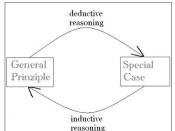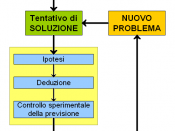Everyday people employ the use of logic to help them clarify or solve problems. Logic may only provide validity or highly probable ideas, but the correct answer, if any, is left for one to decide. The science of thinking and rationalizing, logic is like a double-edge sword. When logic is utilized it may become an efficient tool, capable of discovering correct ideas and understandings. Yet, it can also become an unsolvable maze, causing more confusion than clarity. There are certain methods of logic to determine possible solutions for a problem and to verify them. Induction and deduction are arguments that may give a solution, which is not considered absolutely true but rather having correct reasoning. For logic can only determine "the distinction between correct and incorrect reasoning" (Copi, p.5) of a problem. Well these methods can be useful; it still can make a problem more confusing such as with the case of paradoxes.
It is up to one to make the leap of faith to decide if the conclusions of the methods are acceptable in practice or not.
The argument of induction is based upon the idea of having a set of given general information called the premise. From the premise, one then can formulate a conclusion that supercedes the information, from the problem. A simple example of this is:There was one apple missing from the basket that was in the house.
John was seen leaving the house with an apple.
Therefore John must have taken the apple.
The conclusion made from this argument seems right, but an inductive argument can only produce a probable answer and therefore is not absolutely true. So when induction is used, there is still a chance that the conclusion might be wrong. Hence any inductive conclusion must be thought as highly probable but having...


